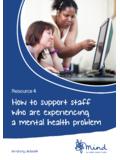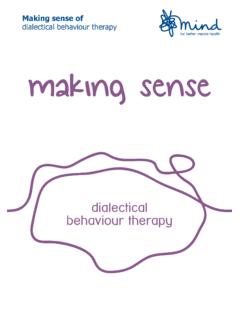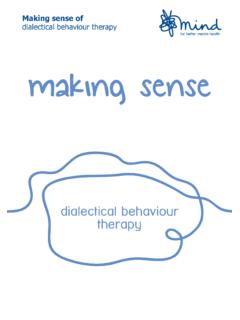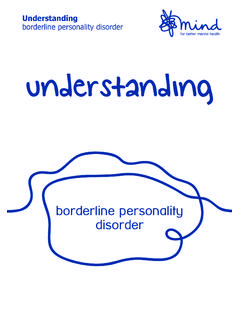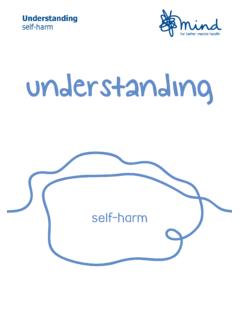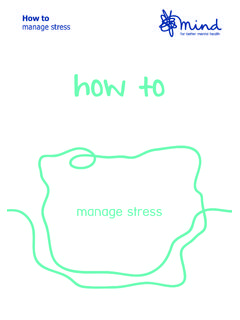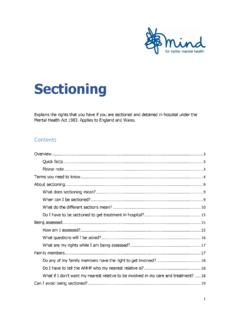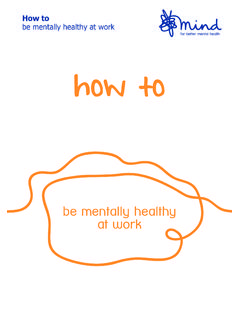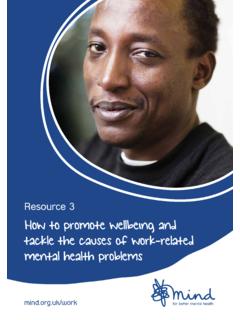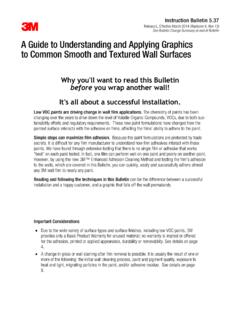Transcription of Open tin of fish, drain liquid, stir into Rinse dried ...
1 Get professional supportSometimes the best way to improve your diet is with the help of a health professional. Dietitians can help you work on specific problems. Nutritional therapists can help you improve your overall could ask your GP to refer you, or look for private practitioners at or Take care of yourselfRemember that other factors can help improve your mental health as well, such as: getting physical activity (especially outdoor activity to boost your vitamin D levels) maintaining good relationships avoiding substance t give upMaking changes can be really tough especially if you re feeling low, or you re used to eating sugary snacks (sugar is addictive). You might not feel better right away, and there might be times where you feel don t stop trying! Think of it as an ongoing experiment to see how much better you can feel. Food and moodEating a healthy diet can do a lot to improve your mood and sense of wellbeing. Use these tips to start making positive changes in the way you meals and cooking Preparing your own food might feel daunting, but cooking with others can be a lot of fun.
2 Ask your family, friends, colleagues, and other social groups to join in they might be very happy to plan, cook and eat a meal together with you. Plan aheadIf you have times when you re feeling well and enjoying preparing food, try making some extra meals to store. You could make enough to last for several days, and freeze them in portions to use at times when you can t face cooking. Investigate intolerancesIntolerances to particular foods (such as wheat, dairy or yeast) can cause lots of unpleasant feelings, both physical and mental. Ask a health professional to help you investigate your tolerances a food diaryWrite down what you eat and make notes about how you re feeling. Over time you might work out how particular foods: make you feel worse, or better keep you awake or help you it can be reassuring to track improvements in your the labelsBecoming a food detective can help you avoid unnecessary additives that can affect your mood, such as: Monosodium glutamate (MSG or E621).
3 Glutamate is a brain chemical, and can make some people depressed. Artificial sweeteners, such as aspartame (E951). Preservatives; such as sulphur dioxide (E220). Colourings, such as tartrazine (E102).This recipe is an example of how you could combine a range of proteins, omega-3 fats, vitamins, wholegrains and healthy gut foods in a single meal. It s also low in sugar, caffeine and additives. 250g packet of wholemeal pasta 100g jar of pesto 180g tin of tuna in brine or water 250g mixed lettuce leaves 1 ripe avocado 50g of seeds (sunflower and pumpkin) fresh fruit (such as 1 apple and 1 banana) 8 dried apricots 40g broken walnuts 4 spoonfuls of plain probiotic yoghurtMain coursePasta with pesto and oil-rich fishSide dishAvocado salad & seedsDessertFruit & yoghurt1 Cook the pasta in boiling water following packet instructions, then Add 3 tablespoons of pesto to drained pasta and mix Open tin of fish, drain liquid , stir into pasta and Wash the salad leaves, and place on a Remove skin and stone from avocado, slice, and add to Sprinkle seeds over salad and Wash fresh fruit and cut into small pieces (removing core if you want).
4 2 Rinse dried apricots, cut into quarters, then put in a bowl with the yoghurt and Serve with walnuts sprinkled over the : 2 4 peopleTime: 20 minutesCost: under 10 Skill level: easyYou Will NeedHow to make itThe Mind MealSwap in: gluten-free pasta; nut and dairy-free pesto; any oil-rich fish, such as salmon, sardines or mackerel; soybeans; roasted butternut in: spinach or watercress leaves; other seeds, such as flaxseed, linseed or a mixture; a light drizzle of olive in: any fresh fruit, such as strawberries or pears; any dried fruit, such as cranberries; any nuts, such as almonds or pecans; dairy-free Mind Meal is based on a recipe created by Amanda Geary, nutritionist and founder of The Food & Mood and Mood For more information on food and mood, go to Mind s website: Mind 2015. To be revised 2018 References available on request ISBN 978-1-906759-98-8We re Mind, the mental health charity. We re here to make sure anyone with a mental health problem has somewhere to turn for advice and support.
5 Mind Infoline: 0300 123 3393 / / You need at least two pints of water daily to stay hydrated some water is in your food, but you need to drink the rest. Ordinary tea and coffee don t count, because the caffeine in them makes you need the toilet. Alcohol and sugary drinks like fruit squash or cola don t count either. You might feel noticeably better quite quickly if you drink less caffeine or avoid it altogether. It might take your gut time to get used to a new eating pattern, so make changes slowly to give yourself time to adjust. Eating breakfast gets the day off to a good start. Instead of eating a large lunch and dinner, try eating smaller portions spaced out more regularly throughout the day. Avoid foods which make your blood sugar rise and fall rapidly, such as sugary snacks, sugary drinks, and alcohol. Eating a variety of different coloured fruits and vegetables every day means you ll get a good range of nutrients several portions of the same type of food won t be so good for you.
6 Tomatoes, mushrooms and bananas all contain high levels of potassium which is essential for your whole nervous system, including your brain. Try eating some vegetables raw, as cooking can destroy some vitamins. You can learn more about healthy portion sizes at Try to avoid anything which lists trans fats or partially hydrogenated oils in the list of ingredients (such as some shop-bought cakes and biscuits). They can be tempting when you re feeling low, but this kind of fat is bad for your mood and your physical health in the long run. If you eat meat, choose the best quality meat you can afford. Higher welfare meat is much better for you than meat from factory-farmed animals because it has more nutrients and less fat. Whatever your diet, why not do some research into other foods contain that protein, and find something new to try? Food and moodHow regularly do you eat?If your blood sugar drops you might feel tired, irritable and depressed. You need to eat regularly to keep your sugar level steady, and choose foods that release energy energy foods include: protein foods, nuts and seeds, oats and you get your 5 a day?
7 Vegetables and fruit contain a lot of the minerals, vitamins and fibre we need to keep us physically and mentally healthy. Do you keep yourself hydrated?If you don t drink enough water, you may find it difficult to concentrate or think clearly. You might also start to feel constipated (which puts no one in a good mood).Good drinks include: water, herbal or green tea, or diluted fruit you eating the right fats?Your brain needs fatty oils (such as omega-3 and -6) to keep it working well. So rather than avoiding all fats, it s important to eat the right ones. Good fats are in: oily fish, poultry, nuts (especially walnuts and almonds), olive and sunflower oils, seeds (such as sunflower and pumpkin), avocados, milk, yoghurt, cheese and eggs. Are you getting enough protein?Protein contains amino acids, which make up the chemicals your brain needs to regulate your thoughts and feelings. It also helps control your blood sugar levels. Protein is in: lean meat, fish, eggs, cheese, legumes (peas, beans and lentils), soya products, nuts and you having too much caffeine?
8 Caffeine is a stimulant. Having too much can make you feel anxious and depressed, disturb your sleep (especially if you have it last thing at night), or give you withdrawal symptoms if you stop is in: tea, coffee, chocolate, cola and other manufactured energy drinks. How s your gut feeling?Your state of mind is closely connected to your gut, not just because of your physical comfort, but also because your gut uses many of the same chemicals as your brain, and communicates with gut foods include: fibre (in fruits, vegetables and wholegrains), and live yoghurt which contains the relationship between what you eat and how you feel. Improving your diet can help give you: positive feelings clearer thinking more energy calmer moods.

